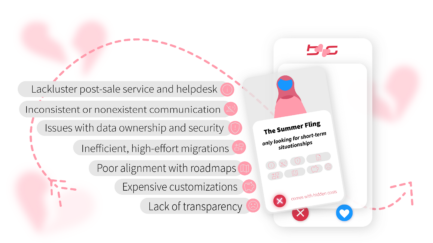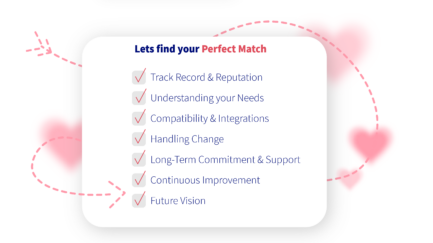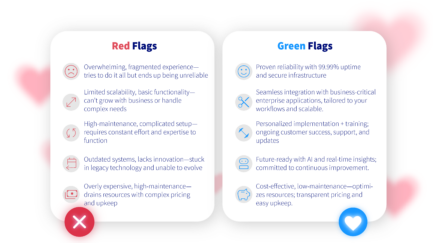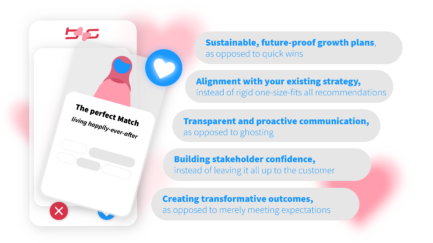The original version of this article was posted to LinkedIn on February 12, 2025 and is available here.
Are your prospective tech vendors, and the partners who introduced you, truly committed to a lasting relationship? Or just a fleeting connection?
As suitors, they may say so—they may promise brighter days, a true partnership—and some really mean it. Some even deliver. But how can you be sure?
At a time when the majority of business executives find it difficult to quantify the benefits of tech investments, decision-makers need more than the reassurances provided by a strong sales demo. They need demonstrable impact, not just cost. They need indicators of true long-term commitment, not just short-term wins.
They need aligned partnerships that will build lasting value.
In this post, we’ll demonstrate why reliable, scalable, and secure long-term vendor relationships are so important, as well as what to look for when trying to find one.
When Vendors Aren’t What They Seem
Trust your instincts. It’s a good philosophy for navigating life, but a gamble when it comes to evaluating tech vendors. A flashy demo, or the promise of “quick wins”, may make a lot of sense—it may even make a lot of business sense, at least in the short term.
But there’s a reason that top analysts recommend rigorous evaluation processes: even the best-intentioned vendors can end up being less than what they present early on. They may even have red flags that they themselves are unaware of, but that a strong evaluation framework will likely reveal.
How Choosing the Wrong Tech Vendor Can Cost You
Give your business to one of these vendors and you may end up in a situationship that comes with hidden costs. These costs can be both qualitative and quantitative, such as:

Take Generative AI (GenAI) as an example. Let’s say you’re considering a GenAI solution for your contact center operations. How GenAI is priced alone may have far-reaching implications. Does your vendor charge per query? Per result? What will happen to cost as operations scale and breach any pre-determined caps?
Perhaps most importantly, how prepared is your vendor to work with you to find the right approach to pricing for your particular deployment (not to mention implementation roadmap, customizations, etc.)?
Assessing New Vendors for a Longer-Term Relationship
There’s too much at stake to get involved in a situationship. What tech buyer wants to deal with a routine lack of certainty, clarity, and commitment? To find tech vendors that are actually in it for the long haul, you need to know what to look for.

These days, this includes knowing an awful lot about your organization.
For example, what are your value drivers for new tech investments? AWS strategist Chris Hennesey reminds us of five critical value drivers to keep in mind:
- Cost savings (total cost of ownership)
- Staff productivity and efficiency
- Operational resilience (business continuity)
- Business agility (time to market, time to insight)
- Sustainability (environmental impact)
The ability to support these value drivers may vary from vendor to vendor. At which point, the question becomes: how well does the vendor (and their proposed solution) align with business objectives at the strategic level? What about your expectations for user adoption and standards for service quality? Do they pass your checklist for things like features, pricing, and tech support?
13 Questions to Ask When Evaluating a Tech Vendor

Whether you end up asking your vendors these questions straightway or not, you should know the kind of answers you’re looking for. And you should be on the lookout for the answers your vendors provide, even when you don’t ask the questions directly.
- What’s your company’s track record with similar projects in our industry?
- Can you provide references, reviews, and results from past/current clients, ideally in the same industry?
- What’s your process for understanding our business needs and goals?
- What are the different integrations for this product with other existing systems?
- How, specifically, does your solution drive value? What gains can we expect in terms of productivity and efficiency?
- How (reporting, dashboards, etc.) will your team communicate about performance and how often?
- How do you handle changes in project scope or requirements?
- Who will be assigned to our account to facilitate post-sale communication? What is your process for conducting regular check-ins and progress updates?
- Can you provide a detailed plan for post-implementation support and maintenance?
- Will your team participate in relevant strategy and planning sessions?
- What’s your approach to continuous improvement and feedback loops?
- What’s your response time for support requests?
- How does your solution fit our long-term business objectives?
Green Flags to Look for When Evaluating Contact Center Solutions
What you’re looking for are indicators that the vendor is committed to what CIO calls a proactive, collaborative partnership. Often, organizations will use a technology partner as their matchmaker. Tech partners (like b+s) can help evaluate vendors, or pitch their own vetted solutions. Think: throuple, instead of just a couple.
When it comes to helping organizations find the right contact center solutions, specifically, here are the green flags/red flags we look out for:

Finding a Match Amidst a Flurry of Tech Trends: The Conversational AI Example
Earlier, we mentioned conversational AI for a reason. When new tech trends emerge within the contact center—especially those with such promise for strong ROI—there’s often a mad dash to adopt. As with any vendor—maybe more so—getting your vendor wrong can be costly.
The conversational AI example underscores yet another layer to the vendor evaluation framework. Again, it’s not unlike the dating world: before testing the market, it helps to know what you’re looking for, why, and if now’s the right time to get involved at all.
InFalse friends or good ends, McKinsey Digital offers four guides for navigating new tech trends like conversational AI:
- Does the trend offer disruptive business value?
- Does it enable your organization to work more independently?
- Does it support better connectivity and collaboration?
- Is it well suited to create improvements across your entire technology landscape?
Again, let’s not forget pricing, which will have direct and indirect bearing on the answers to all four questions. Boston Consulting Group, another leading consultancy, recommends a strategic approach to GenAI pricing, in particular, one that accounts for relevant data sources, operating environment, and perceived value.
The nuance inherent to the conversational AI example speaks to the level of detail required to find the potential long-term tech partnerships—especially when the list of potential suitors is so vast. Likewise, it reveals in stark contrast how easy it is to find yourself in a situationship with tech vendors.
Bucher + Suter’s Approach to Building Long-Term Partnerships
In the end, what you’re looking for is stability, trust, and future-forward innovation. These three tenets characterize our own approach to long-term partnerships, both with the tech vendors we work with, and our customers. That is, a focus on:

In other words, a true matchmaker that sticks around from the evaluation period to long after implementation is complete. A partner that’s willing to play couples therapist in the name of helping the relationship flourish.
In support of this philosophy, we provide our customers with access to a highly responsive customer service offering, access to b+s Hub (a one-stop-shop for access to case management, the latest product information, and knowledge articles), and a dedicated Customer Success team.





